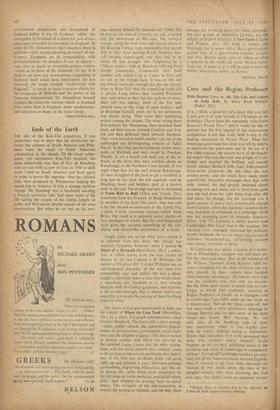Ends of the Earth
THE aim of the Kon-Tiki expedition, if you remember, was to show that the similarities be- tween the cultures of South America and Poly- nesia were the result of South American colonisation in the islands. Of the many subse- quent raft adventures Kon-Tiki inspired, the most remarkable was that of Eric de Bisschop, who set out with a crew of four in 1956 to drift from Tahiti to South America and back again in order to prove the opposite—that the cultural links were produced by Polynesians making the round trip to America. It was a strange, reckless voyage. De Bisschop was a hardened sea-dog, a French aristocrat who had spent most of his life sailing the oceans of the world, largely in junks and Polynesian double-canoes of his own construction. But when he set out on his two- year odyssey aboard the bamboo raft Tahiti Nui he was an old man of sixty-six, too old, it turned out, for adventures of this sort. The outward voyage, using the west wind and current down in the Roaring Forties, went reasonably well, except that as they were nearing South America their raft became waterlogged, and they had to be taken off and brought into Valparaiso, by a Chilean cruiser—with dt. Bisschop suffering from double pneumonia. Undeterred, they built another raft, sailed it up to Callao in Peru and set out on the voyage back It was on this last leg (which, ironically enough, was the one already done by Kon-Tiki) that the expedition really fell to pieces. Long before they reached Polynesia they were down to their last few gallons of water, their raft was sinking, three of the five men aboard were on the verge of open mutiny—and de Bisschop himself, worn out by his privations, was clearly dying. Then came their tantalising arrival among the islands. The wind swung them first towards the Marquesas, then snatched them back, set their course towards Caroline and Vos- tok and then deflected them towards Starbuck. They were forced to build another raft out of the submerged and disintegrating remains of Tahiti Nui .11. In this they passed helplessly within thirty miles of Starbuck and were swept by Penrhyn. Finally, in yet a fourth raft built out of the re- mains of the third, the were washed ashore on Rakahanga, in the Northern Cook Islands. It was night when they hit the surf around Rakahanga. As they struggled in the dark to get a foothold at long last on dry land, the raft capsized—and •de Bisschop, weak and helpless, died of a broken neck in the surf. The strange,sad epic is recounted in From Raft to Raft (Allen and Unwin, 21s.), translated from the Swedish of Bengt Danielsson (a member of the Kqn-Tiki crew), who was told it by the second-in-command of the Tahiti Nui, a plain French merchant seaman called Alain Brun. The result is a curiously naïve, matter-of- fact catalogue of events. But the undistinguished style gives the account something of the sim- plicity and dream-like remoteness of a myth.
Jungle yarns are to me what grass pollen is to sufferers from hay fever. My allergy was instantly forgotten, however, when I opened In Quest of a Mermaid (Hart-Davis. 18s.), a collec- tion of tallish stories from the teak forests of Burma by the late Colonel J. H. Williams, the author of Elephant Bill Colonel Williams was an old-fashioned storyteller of the very best sort, wonderfully neat and skilful. He saw a ghost, caught a mermaid, knew a man who swam under a mountain, got involved in a very strange business with two Indian gardeners. and recounts it all so entertainingly that it almost makes one regret for a moment the passing of those far-flung imperial times.
The traces of that past imperialism in India are the subject of Where the Lion Trod (Macmillan, I 8s.), by a Daily Telegraph correspondent called Gordon Shepherd. 'I he lion's trail is clear enough —clubs, public schools, the upholstered impedi- menta of parliamentary government, social snob- bery and the English language. The last is locked in • mortal combat with Hindi for survival as the national lingua franca, but the other institu- tions, and the social outlook they embody, seem to be passing comparatively painlessly into India's way of life. One day, no doubt, India will catch right up and become a cosy, television-owning, car-washing, dog-loving Macocracy just like us. In Kenya the cattle, freed from rinderpest by the blessings of white medicine, multiplied splen- didly--and stripped the grazing back to naked desert. The struggles of the administration to restore the ecological balance, and the way thew changes are breaking down the tribal communi- ties into groups of individual farmers, are the subject of Elspeth Huxley's A New Earth (Chatto and Windus, 30s.). The book is earnest and thorough, but it seems rather .like a government- guided tour of a government-imposed project, and Mrs. Huxley never tires of telling us what a spanner in the works all those African politi- cians are. It looks as if it will be quite a time yet before Macocracy comes to Kenya.
MICHAEL .F101"14






































 Previous page
Previous page